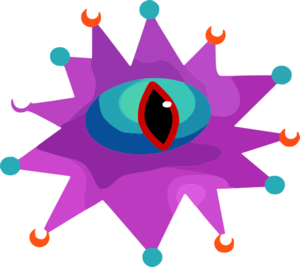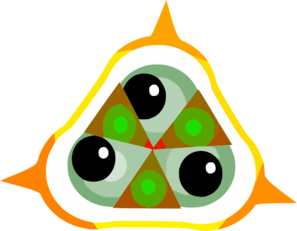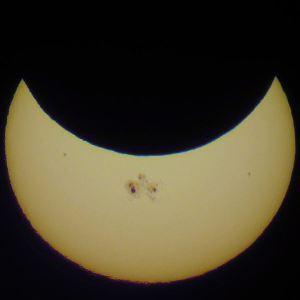Kate Rauner's Blog, page 92
October 31, 2014
You Don’t Have Ebola
This is a short post, sort of a public service announcement. I’m afraid the flu season in the US will be dreadful, as panicked people with the flu think they have Ebola. Relax. If you are not in the thick of treating Ebola patients, you don’t have it. Here’s a short, straightforward article on how Ebola spreads: http://www.livescience.com/48547-ebola-sneeze.html?google_editors_picks=true








October 29, 2014
Eclipse – Haiku by Kate Rauner
What I think I know grows dim
As night comes to day
Inspired by last week’s partial solar eclipse. There was also a sunspot group visible without magnification. Note I didn’t say “naked eye.” Never stare at the sun. It’s not the eclipse that burns your eyes – it’s the sun, and it can harm your vision any day. I hope North Americans took the time to view the event through a solar filter or with a pinhole projection. I saw a 40% eclipse. That’s not enough to notice a drop in light levels or air temperatures. I bet most people didn’t even know anything was happening.
PS: I didn’t realize until days later that the big sunspot group was causing some people to freak out: solar flares erupting








October 25, 2014
Sols on Mars
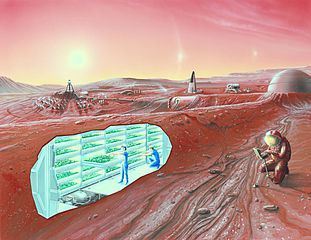
Colony concept. Cutaway shows underground hydroponics.
I’m working on a new book for next summer set at a colony on Mars. Personally, I feel conflicted about colonizing Mars. It will be such a hard life, huddled inside tiny quarters, subsistence farming, and dependent on technology to do everything including breath. A recent MIT study raises a fear I hadn’t thought of: raising enough plants in a small space may generate so much oxygen that fire becomes a huge hazard. They also think the technology isn’t as much of a slam-dunk as Mars One advertises. So I don’t think I have to worry about the possibility for myself.
But my question today is less profound.
When writing about people on Mars, it seems to me I need to use some terms that acknowledge the differences in years and days between Earth and Mars. NASA uses the term “sol” for a Martian day, which is only slightly longer than an Earth day. “The word ‘yestersol’ was coined by the NASA Mars operations team early during the MER mission to refer to the previous sol (the Mars version of ‘yesterday’) and came into fairly wide use within that organization during the Mars Exploration Rover Mission of 2003. It was even picked up and used by the press. Other neologisms include ‘tosol’ (for ‘today’) and ‘nextersol’, ‘morrowsol’, or ‘solmorrow’ (for ‘tomorrow’)” Wikipedia
Much as I love these terms (“nextersol”, how cool is that?) I’m concerned a reader will trip over them and ultimately find them annoying and distracting. Knocking a reader out of the story is too high a price to pay just because I think the words are cute. I recall a tip I read somewhere: Write for yourself, and edit for your readers.
What do you think?








October 22, 2014
I’m No Scientist – a poem by Kate Rauner
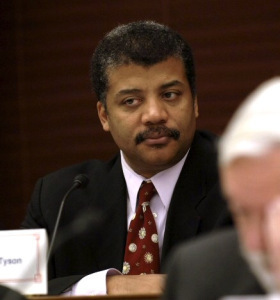
Neil deGrasse Tyson, scientist
“I’m no scientist.”
To say that’s just a pose,
A way to say that I insist
On things I wish were so.
I shove my fingers in my ears
And hum to drown the noise
Of the grim reality
Of truth that brings no joy.
Knowledge that upsets my friends
Will only cause me pain,
Will only get me tossed aside,
Abandoned once again.
Science always moving
Closer to the facts.
Demanding to me that I change
Is just too much to ask.
Claiming “I’m no scientists” is a sadly understandable way to duck an issue in politics (though I’ve got to wonder why that’s okay), but it’s no way to understand problems, or solve them. Surely we can do better. Give yourself a break – you didn’t create most of the opinions you reiterate. “When my information changes, I alter my conclusions. What do you do?” An apocryphal quote, most appropriate to the topic.








October 18, 2014
Terrible Illness, Terrible Treatment
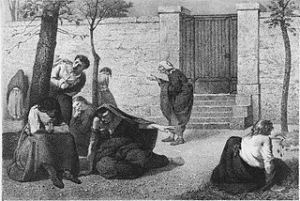
19th century illustration of mental illnesses
Treating mental illness is difficult and we don’t always know what to do. On a personal note, I have ties to four people who committed suicide while under doctors’ care. That’s hard to accept in the world of modern medicine. Even people with good access and good insurance may continue to suffer, which I suspect increases public skepticism. Why pay for treatment programs if they don’t work?
I’ve read Anatomy of an Epidemic, by Robert Whitaker, which says the powerful psychoactive drugs used for schizophrenia, bipolar disorder, and depression may work in the short-term but, paradoxically, make long-term mental health worse. Now there is a study, discussed here, suggesting that drugs widely prescribed for insomnia and anxiety increase a person’s risk of developing Alzheimer’s. The article addresses some of the questions we should ask when reading about a medical study: cause versus correlation, relative versus absolute risk, and the effects of dose levels. The risk seems significant in a colloquial as well as a statistical way.
Interestingly, another article I read the same day says that talk-therapies are equally effective as drugs for social anxiety and should be tried first.
Whitaker found evidence that the outcome for patients with mental illnesses has been getting worse over time in the United States and most other wealthy countries despite the medicines available. But he also found a success: Finland had high rates of schizophrenia in the 1970s but today has good long-term outcomes. They use a combination of therapies, non-drug treatments and judicious drug prescriptions.
My post has wandered over a range of conditions and worries. There’s a lot for anyone to consider and science has no foolproof answers. The links above are all popular sources, not scientific journals, and consulting medical experts is a must. Treatments offer risks and benefits, but there are no magic drugs.








October 15, 2014
Ferns – Haiku by Kate Rauner
Ferns flow down the slope
Lacey waves break on my knees
In the wood’s deep shade.
This is my last haiku inspired by this year’s visit to the forests of the Northeast. You may also enjoy my other haikus from these forests: Leaves #1, Leaves #2 and Leaves #3.








October 13, 2014
Story of Americas You Don’t Know, Pre-European
Happy Columbus Day – or maybe Sad Columbus Day. It’s ironic in America that a holiday started to help combat anti-Catholic and anti-immigrant (especially anti-WOPs) feelings is becoming viewed as an unseemly celebration of a brutal conquest. It’s confusing when the meaning of something from my childhood changes. For those of you who know more about the “conquest” interpretation, please consider that those who view Columbus Day as a positive holiday may not be bigots – they may just be showing their age. All of us can enjoy this article from 2002:
“Before it became the New World, the Western Hemisphere was vastly more populous and sophisticated than has been thought—an altogether more salubrious place to live at the time than, say, Europe. New evidence of both the extent of the population and its agricultural advancement leads to a remarkable conjecture: the Amazon rain forest may be largely a human artifact.”








October 11, 2014
Sphere, a Hit Science Fiction Novel
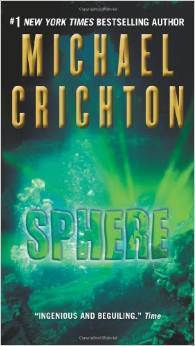 In my attempt to understand writing advice, I’m reading popular science fiction novels with an eye to learning. I recently read Sphere by Michael Crichton. The book has a 4 1/2 star average on Amazon with 831 reviews, 83% of them giving 4 or 5 stars. That’s beyond popular – it’s phenomenal. The criticism I noticed most was from readers who disliked the ending. There was a one-star review that said “a book that kept me up until 3 a.m.” but the reviewer didn’t like the ending. As a new author, I think I’d be thrilled with that review.
In my attempt to understand writing advice, I’m reading popular science fiction novels with an eye to learning. I recently read Sphere by Michael Crichton. The book has a 4 1/2 star average on Amazon with 831 reviews, 83% of them giving 4 or 5 stars. That’s beyond popular – it’s phenomenal. The criticism I noticed most was from readers who disliked the ending. There was a one-star review that said “a book that kept me up until 3 a.m.” but the reviewer didn’t like the ending. As a new author, I think I’d be thrilled with that review.
As a reader, I enjoyed the book and happily read to the end. Like some reviewers on Amazon, I noticed a similarity to the classic scifi movie Forbidden Planet, but the setting is different enough that it didn’t bother me. Crichton is known for basing his stories on science, and Sphere includes a neat view of life in a deep (really deep) sea habitat. Since the story is fiction, the author is entitled to departures from reality even in the (presumably) real portions of the story. For example, after a description of how sounds go squeaky in a helium-dominated atmosphere, each character hangs a “talker” around their neck. I wonder if there is such a thing, or if it’s simply convenient that they speak in normal tones for the rest of the story. (I often wonder how much nonsense is inside my head because of something I read in fiction that sounded real enough to believe.)
Did Crichton follow typical writing advice?
The advice: Characters should have demographic, family, and psychological histories.
Crichton gave his protagonist some perfunctory family background that, for me, could have been skipped entirely. The protag’s technical background as an academic psychologist is important to the story and Crichton offers an entire chapter on this. I found that chapter interesting, but the story would have been the same if Crichton wrote one paragraph saying ‘he’s a big-shot psychologist.’ It was a “data dump” but it didn’t discourage me from continuing to read.
Why did it work? Crichton interspersed the data dump with some comic elements (political big-shots asking silly questions about aliens). He presented the dump early, so it did not interrupt the action. He limited his data dumps: other main characters were given technical backgrounds that supported what they did in the story, but only the protag at the data dump level.
The advice: Show, don’t tell.
Crichton “told” often. Some was in context – the leader gives a briefing to new arrivals. Some was blatant telling in the narrator voice: “Many theorists argued… Men already had trouble communicating… Yet men and dolphins might appear virtually identical… But the field of knowledge we were most likely to share…” That is the beginning of each of a string of paragraphs. The “telling” ends by coming back to why “the team mathematician was going to play a crucial role.” Crichton often simply tells something, then proceeds to use the information in the story. But some of his telling is not critical to the story.
Why did it work? It was easy to swallow. For me, the science in the “telling” sounded real and interesting. Otherwise, the “told” information was slipped in easily and used immediately.
The advice: Avoid “saidisms”. He said, she said, is best unless you can drop the “said” altogether because it’s obvious who spoke.
This is advice Crichton follows. And, rather than inserting the dreaded adverb, Crichton couples dialog with action:
“‘Oh my God,’ she said. She pushed her thick dark hair away from her face.” (As an added bonus, this character’s physical description becomes a plot point late in the book);
“Norman went on in a rush. ‘And when does Jerry…'”
The advice: details of the setting must matter to the story and be there for a reason. The character’s perception of the setting matters more than objective description.
Crichton follows this advice. The setting is strange and unfamiliar, inherently dangerous – a deep sea habitat with helium-dominant atmosphere. Crichton is known for the science and technology behind his settings. His descriptions gave me a good picture of what it would be like in such a place and I can follow how it falls apart during the story. The main character often gives his personal perception of the setting.
What did I learn? Crichton puts in words that are necessary to the story or the setting. Description creates reality for the reader, and Crichton creates a believable world. Where showing would cost a lot of words, he tells the reader something simply – then uses the information (though I might quibble on some of the backstory).
While no single book makes everyone happy, Sphere is a smash hit. I’ll try to learn from it. If you’ve read Sphere, why do you think it worked? Or not?
By the way, Sphere’s copyright is 1987. Do you think I’m making a mistake looking at an older book for guidance? Has the measure of fiction writing changed enough in thirty years to make its appeal irrelevant?








October 9, 2014
Stephen King's advice in his book On Writing
He defines stories as "vividly imagined waking dreams," a form of telepathy between writer and reader over time and space. He also notes that "most books about writing [fiction] are filled with bullshit... shorter the book, the less the bullshit."
The first seventy pages (of a two-hundred page book) talk about his life, mostly childhood and early influences. He started submitting short stories to magazines in his teens, when a few hand-written words on a form-letter rejection were cause for celebration. King thinks this is still the way to get started, especially to get an agent: get your stories published by little outlets (that may only pay in copies of their magazine); that's how you build your credentials. (I should point out that the book has a copyright of 2000, so King's advice pre-dates the recent boom in self-publishing, especially of ebooks.)
It's a nice introduction to King's style, but I must admit that, anxious to get to his writing advice, I skimmed much of it.
I'm going to include a lot of King's specific advice; because I'm sure you're more interested in his opinions than in mine.
King offers advice about the mechanics of writing:
• Use The Elements of Style.
• Avoid the passive tense - King thinks people write in passive because they are fearful or think it sounds impressive, but it's weak.
• Purge adverbs! "The adverb is not your friend" and "the road to hell is paved with adverbs."
• Vocabulary - "don't make any conscious effort to improve it... use the first word that comes to your mind, if it is appropriate and colorful."
• "The best form of dialogue attribution is said, as in he said, she said."
• Paragraphs should be neat and utilitarian.
• When he presents a "rule" he also discusses exceptions and authors who successfully violate the rule.
I think the core of the book is about how to be a writer of stories. Some of his comments sound discouraging: "If you don't want to work your ass off, you have no business trying to write well," and "if you're a bad writer, no one can help you." (If you're a great writer, no one knows how you got there.) But King also mentions the joy and "buzz' of writing several times and says practice can make a competent writer into a good writer.
King's "Great Commandment" is to "read a lot and write a lot," four to six hours a day. "Reading is the creative center of a writer's life" and "the more you read, the less apt you are to make a fool of yourself."
He also advises writers to be brave. "Fear is at the root of most bad writing... Good writing is often about letting go of fear and affectation."
King says that "stories make themselves." He finds stories like fossils in the ground, part of an pre-existing world. Find a story and give it a place to grow.
Stories and novels consist of three parts: narration (to move the story), description (to create reality for the reader), and dialogue (to bring characters to life). Plot is not one of these parts.
I admit to some confusion over the difference between "plot" and "story", but for King plotting ruins spontaneity. Outlines and character notes are "tyranny" and a strong enough situation renders plot moot.
For his own work, King bases each book on a situation where a group of characters (flat and featureless as he begins) are in some predicament and they try to work themselves free.
King's writing method is interesting. He says:
• Set up a simple, humble work space without distraction and close the door.
• Write every day - if you don't, characters become stale and you'll lose hold of plot and pace.
• Be honest about how your characters speak and behave, even if they are ignorant, bigoted, or otherwise silly or disreputable.
• Back-story helps define characters and motivation, so get it in quickly but remember that most of it isn't interesting. Flashbacks strike him as boring and corny. It's easy to fall in love with your back-story and research (which is a form of back-story), so pay close attention to any back-story that bores your beta readers.
• A typical novel's first draft should take no more than three months, written at 2000 words a day and only under "dire circumstances" do less. (He allows a beginner to only do 1000 words a day.)
• After the first draft is done, put it in a drawer for six weeks and work on something else. Then take it out, read it, and do a second draft. As you read your first draft, look for the theme and pacing so you can add things that enhance those features and delete things that detract.
• Don't share your draft until you feel it is reasonably reader-friendly. King discusses the roles of his Ideal Reader and beta readers.
• After a third draft or polish, King sends his manuscript off (in his case, to agent and publisher), but notes that by the time the "damn smelly old thing" is in print, he's been over it a dozen times or more.
• I appreciate that he mentions one of my favorite things several times: Afternoon naps.
There's more: writing classes and seminars, how to find and evaluate an agent, use of description and narrative, a first and second draft of a piece of his own writing, and a long list of books he's read. For a short book, it's packed with information.
For me, the most unexpected part of the book was near the end. King includes an account of his near fatal accident in 1999. If you want to know what it's like to be struck by a van while you're out for a walk, this is the section to read. On Writing was the book he was working on, and five weeks after the accident that nearly killed him, he began writing again.
Whether you're interested in Stephen King or in writing fiction, On Writing has something you'll enjoy. For writers, take heart: "The scariest moment is just before you start. After that, things can only get better."
October 8, 2014
Leaves #3 – a Haiku by Kate Rauner
Sifting down through trees
Their journey names the season
Leaves that fall like rain.
I’m visiting the area where I grew up – southeastern New York State. Autumn is well underway here and the leaves are changing color. My first two haiku on leaves are here and here.









